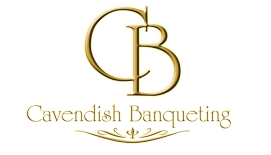Table of Contents
Planning weddings represents one of life’s most significant undertakings, particularly for couples seeking to honour cultural traditions while navigating contemporary British wedding expectations. This comprehensive guide addresses every essential element of wedding planning across the UK, with particular attention to the needs of South Asian, Nigerian, and multicultural couples who wish to create celebrations that beautifully blend heritage with modern sensibilities.
The wedding industry in the United Kingdom has evolved considerably over recent decades, becoming increasingly accommodating to diverse cultural requirements while maintaining the highest standards of service and sophistication. From selecting appropriate venues that can accommodate specific ceremonial needs to choosing attire that honours tradition while expressing personal style, each decision requires careful consideration and expert guidance.
This guide draws upon extensive experience working with families from various cultural backgrounds, providing practical advice that acknowledges both the emotional significance of these celebrations and the logistical complexities they often involve. Whether you’re planning an intimate gathering or a grand celebration for hundreds of guests, understanding the options available and the considerations specific to your cultural requirements will ensure your wedding day reflects your values, traditions, and personal vision.
Weddings Venue Selection Across the UK
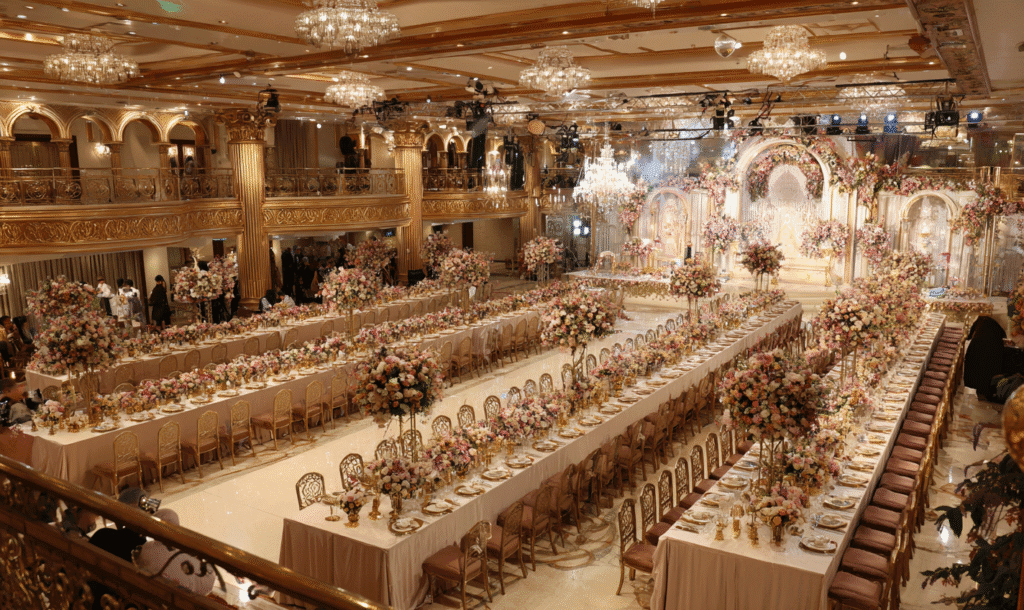
Selecting the appropriate wedding venue forms the foundation of successful celebration planning. The choice extends far beyond aesthetic preferences, encompassing practical considerations such as capacity requirements, cultural accommodation capabilities, and the venue’s experience with diverse ceremonial traditions.
Understanding Venue Capacity and Cultural Requirements
Traditional South Asian and Nigerian weddings typically accommodate significantly larger guest lists than conventional British celebrations. Where a typical British wedding might host 100-150 guests, cultural celebrations frequently welcome 300-500 attendees or more. This reality immediately influences venue selection, particularly in metropolitan areas where space comes at a premium.
When evaluating potential venues, consider not merely the stated maximum capacity but how comfortably that number accommodates your specific requirements. Will there be adequate space for ceremonial elements such as mandap installations for Hindu ceremonies or appropriate staging for Nigerian traditional presentations? Can the venue accommodate pre-wedding events like mehndi nights or traditional engagement ceremonies? These questions become particularly relevant when planning multi-day celebrations that require flexible space utilisation throughout extended celebration periods.
Religious and ceremonial requirements vary significantly across traditions. Hindu weddings require space for sacred fire ceremonies with proper ventilation and safety measures. Muslim celebrations may need separate areas for men and women during specific portions of the ceremony, plus accommodation for prayer times. Sikh weddings centre around the Guru Granth Sahib, requiring appropriate installation space and head covering provisions. Nigerian celebrations often incorporate multiple outfit changes and ceremonial entrances, requiring adequate staging areas and private preparation spaces.
Catering considerations also influence venue selection significantly. Many cultural celebrations require specialist catering that may not be available through standard venue packages. Venues must either provide appropriate cultural cuisine options or allow external caterers who specialise in traditional cooking. Kitchen facilities need to accommodate halal preparation for Muslim celebrations or vegetarian requirements for many Hindu ceremonies.
Regional Venue Options and Considerations
The UK offers diverse venue options across different regions, each presenting unique advantages for cultural celebrations. London naturally provides the most extensive selection, with venues ranging from luxury hotel ballrooms to purpose-built cultural centres designed specifically for diaspora community celebrations. These establishments often employ staff familiar with cultural requirements and maintain relationships with specialist suppliers who understand traditional catering, decoration, and entertainment needs.
Outside London, cities with significant South Asian or Nigerian populations, such as Birmingham, Manchester, Bradford, and Leicester, offer excellent venue options often at more competitive pricing. These regional venues frequently provide more generous space allocations and flexible policies regarding outside suppliers, which can prove advantageous when incorporating specific cultural elements that require specialist providers.
The Midlands region, particularly around Birmingham and Leicester, has developed a strong infrastructure for cultural weddings, with many venues offering comprehensive packages that include cultural decoration services, specialist catering partnerships, and coordination assistance from staff experienced in multicultural celebration requirements.
Countryside venues near major metropolitan areas present another attractive option, particularly for couples seeking exclusive use of historic properties or estates. These settings often provide stunning backdrops for photography while offering the privacy needed for extended cultural celebrations. However, they require additional consideration regarding transportation arrangements for guests, particularly elderly family members who may be travelling considerable distances from urban centres where many diaspora communities are concentrated.
Weddings, Dresses, and Cultural Attire
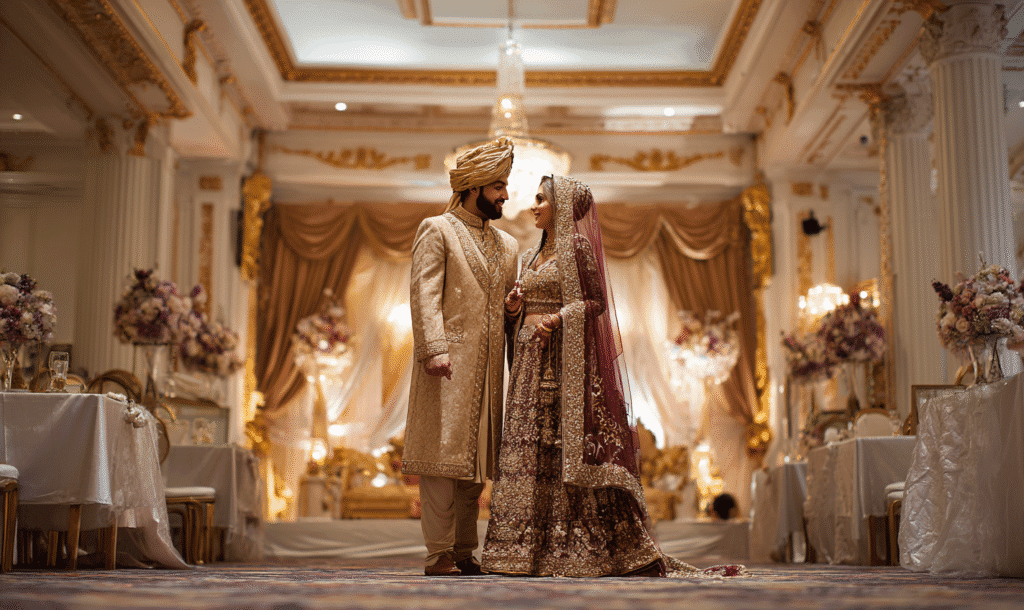
Wedding dress selection for multicultural couples involves balancing personal style preferences with cultural expectations and practical considerations for potentially multiple ceremonies throughout the wedding period.
Traditional Wedding Attire Across Cultures
South Asian bridal attire varies significantly across different regional and religious traditions. Hindu brides traditionally wear red or other auspicious colours, with lehengas, sarees, or Anarkali suits featuring intricate embroidery and precious metal detailing. These garments often incorporate traditional motifs such as peacocks, elephants, or floral patterns that carry specific cultural meanings. Sikh brides often choose pink or red ensembles with matching dupattas and traditional jewellery, including kaleeras and chooda. Muslim brides may opt for more modest silhouettes while still embracing rich fabrics and elaborate decoration, often incorporating deep jewel tones or elegant pastels.
Nigerian bridal attire reflects the country’s diverse ethnic traditions, each with distinct aesthetic elements and cultural significance. Yoruba brides traditionally wear elaborate gele (head wraps) with matching buba and iro, often in vibrant colours and rich fabrics like aso-oke. Igbo brides might choose coral beads and traditional blouses with wrapper skirts, incorporating colours that represent prosperity and fertility. Hausa brides often wear heavily embroidered robes with matching head coverings, reflecting Islamic influences alongside traditional African aesthetics.
The sourcing of traditional wedding attire often requires significant planning and considerable investment. Many pieces require custom creation by specialist designers who understand the cultural significance of specific design elements and traditional construction techniques. This process can take several months, particularly for heavily embellished pieces or when working with artisans based internationally. The cost can vary significantly, from more affordable ready-to-wear options to bespoke creations that may cost several thousand pounds.
Contemporary Interpretations and Fusion Styles
Modern brides increasingly seek ways to honour cultural traditions while expressing individual style through contemporary interpretations of traditional attire. This might involve adapting traditional silhouettes using non-traditional colours, incorporating Western design elements into cultural garments, or creating separate looks for different portions of the celebration.
Many couples choose to wear traditional attire for cultural ceremonies, while opting for Western wedding dresses for civil ceremonies or reception portions. This approach requires careful coordination to ensure smooth transitions between different looks and may necessitate private changing areas within the venue.
The rise of British-based designers who specialise in fusion wedding attire has made these contemporary interpretations more accessible. These designers understand both cultural requirements and British fashion sensibilities, creating pieces that feel authentically connected to heritage while remaining appropriate for UK-based celebrations.
Wedding Rings and Ceremonial Jewellery
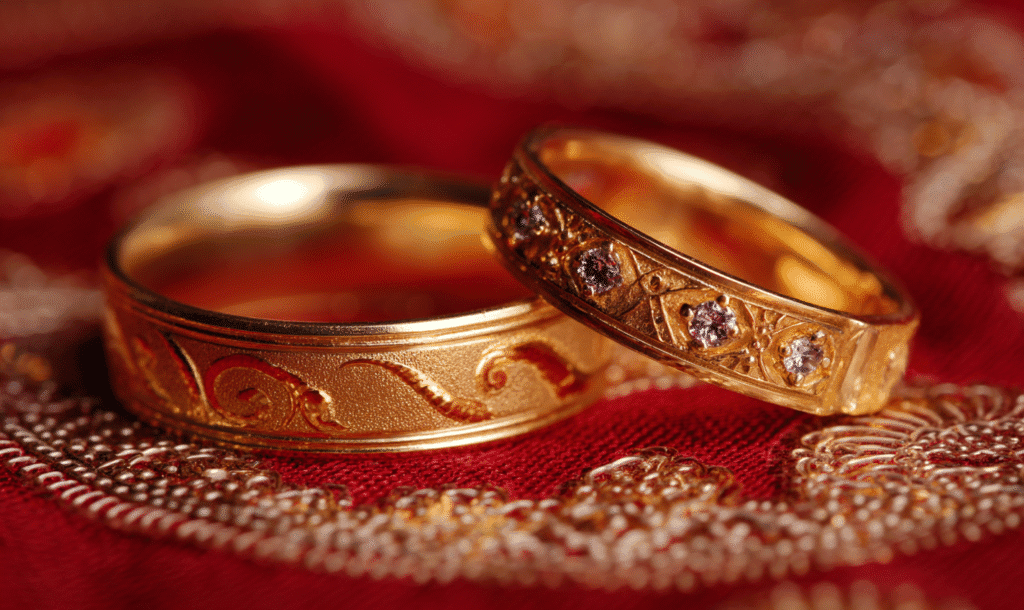
Wedding rings carry deep symbolic significance across cultures, while ceremonial jewellery often plays essential roles in traditional wedding customs. Understanding these elements ensures appropriate selection and incorporation into your celebration.
Cultural Significance of Wedding Rings
While wedding rings represent universal symbols of commitment, different cultures approach their selection and wearing differently. In Hindu traditions, both gold bangles and rings may be exchanged, with gold holding particular auspicious significance. Muslim couples often incorporate verses from the Quran into ring designs or choose specific metals based on religious preferences.
Nigerian traditions vary across ethnic groups, with some incorporating traditional materials or designs that reference ancestral customs alongside contemporary ring exchanges. The timing of ring exchanges may also differ, with some cultures incorporating multiple exchange ceremonies throughout the wedding celebration period.
When selecting wedding rings for multicultural celebrations, consider whether traditional elements such as specific metals, engravings, or design motifs hold particular significance for your families. Many couples choose to incorporate subtle cultural references into otherwise contemporary ring designs.
Ceremonial Jewellery and Traditional Adornments
Beyond wedding rings, ceremonial jewellery often plays an essential role in cultural wedding traditions. South Asian brides typically wear elaborate jewellery sets that may include necklaces, earrings, bangles, anklets, and headpieces, each carrying specific cultural significance.
The selection and sourcing of ceremonial jewellery requires considerable planning. Authentic pieces often involve significant investment and may require custom creation by specialist jewellers familiar with traditional techniques. Many families pass down ceremonial pieces through generations, requiring careful cleaning, repair, or modification to ensure a perfect fit and condition.
Wedding Wishes and Cultural Blessings
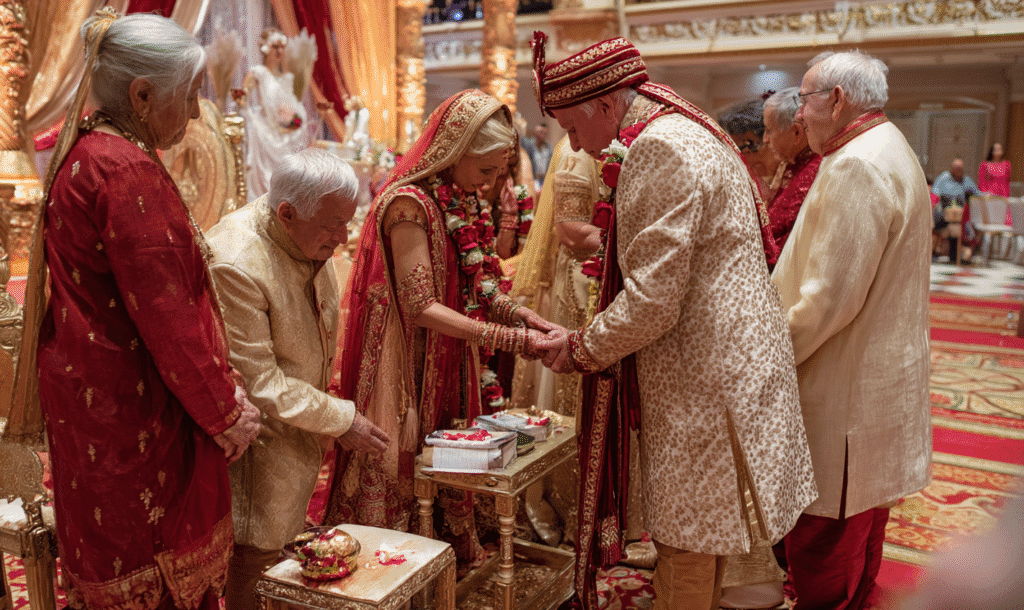
Wedding wishes and blessings form integral parts of cultural wedding celebrations, often carrying deeper significance than simple congratulations. Understanding appropriate expressions across different traditions ensures meaningful exchanges with guests and family members.
Traditional Blessing Formats Across Cultures
Different cultures maintain specific formats for wedding wishes and blessings. Sanskrit blessings in Hindu traditions often reference prosperity, fertility, and spiritual harmony. Arabic blessings in Muslim celebrations frequently invoke divine protection and guidance for the couple’s future together.
Nigerian wedding wishes vary across ethnic traditions but commonly emphasise family harmony, prosperity, and the continuation of ancestral blessings through the new union. These expressions often incorporate proverbs or traditional sayings that carry deeper cultural meaning beyond simple well-wishes.
Understanding these traditional formats allows couples to incorporate meaningful expressions into their ceremonies, invitations, or reception speeches. Many couples choose to include traditional blessings alongside contemporary expressions, creating beautiful bridges between ancestral wisdom and present-day celebrations.
Wedding Anniversary Traditions and Celebrations
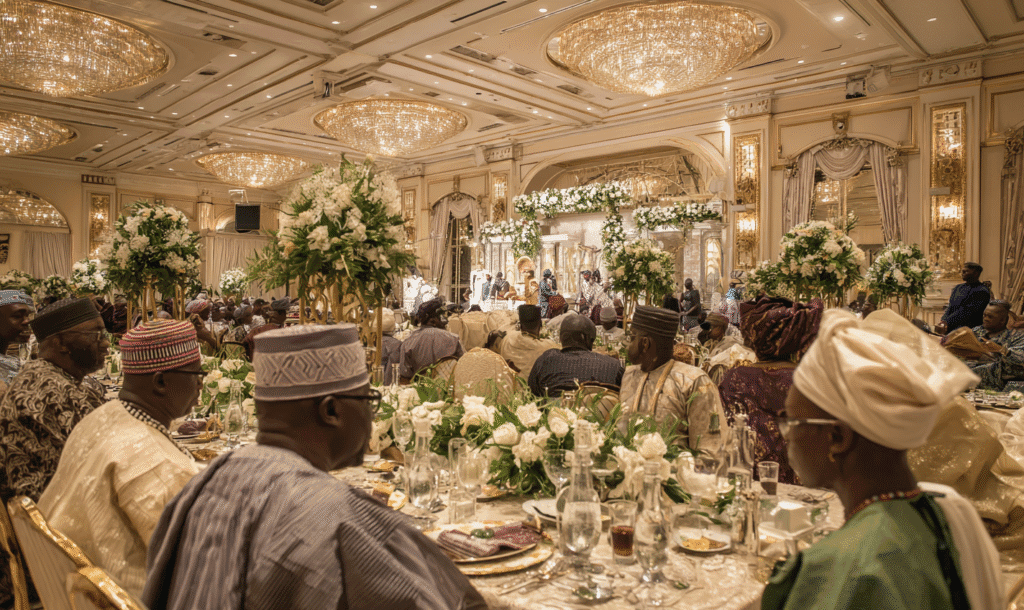
Wedding anniversary celebrations provide ongoing opportunities to honour cultural traditions while building new family customs. Understanding cultural approaches to anniversary recognition helps couples plan meaningful, ongoing celebrations throughout their married life.
Cultural Anniversary Traditions and Milestones
Different cultures emphasise particular anniversary milestones, often with specific customs or celebration approaches. South Asian traditions frequently mark the first anniversary with intimate family gatherings that may include renewal of certain wedding rituals or special prayers.
Nigerian anniversary traditions often emphasise community celebration, with extended family and friends participating in recognition of the couple’s ongoing commitment. Certain milestone years may carry particular significance, requiring special observance.
Understanding these cultural milestone traditions allows couples to plan appropriate celebrations that honour heritage expectations while creating their family customs. Many multicultural couples blend traditional milestone recognition with Western anniversary gift traditions, creating unique celebration approaches.
Wedding Invitations for Multicultural Celebrations
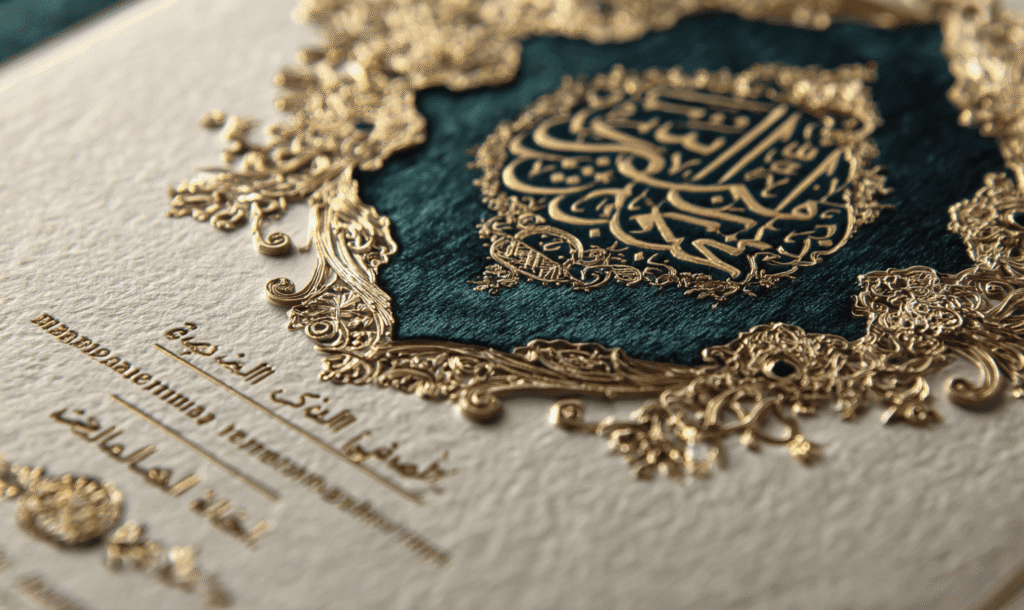
Wedding invitations serve as formal announcements of your celebration, while setting appropriate expectations regarding cultural elements guests will experience. Effective invitation design balances aesthetic appeal with practical information needs.
Cultural Design Elements and Aesthetic Choices
Traditional wedding invitation designs incorporate specific cultural motifs and colour schemes that immediately communicate heritage connections. South Asian invitations often feature intricate paisley patterns, religious symbols, and rich colour combinations such as red and gold.
Nigerian invitation designs frequently incorporate traditional textile patterns or symbols representing specific ethnic heritage. The use of particular colours may reference cultural significance, with certain combinations holding specific meaning within traditional contexts.
Many couples work with designers who specialise in cultural invitation design while bringing contemporary aesthetic sensibilities to create pieces that feel both authentically connected to heritage and appropriately modern for UK-based celebrations.
Practical Information and Multilingual Considerations
Multicultural wedding invitations often require more comprehensive information than typical British wedding stationery. Multiple events over several days necessitate clear organisation, often with separate enclosure cards for each celebration component.
Cultural ceremonies may require explanation for guests unfamiliar with specific traditions. Dress code guidance becomes particularly important when traditional attire is encouraged or when specific modesty requirements apply to religious ceremonies.
Many couples choose bilingual invitations that include text in both English and traditional languages, acknowledging diverse guest backgrounds while ensuring clarity for all recipients. Digital wedding websites often complement physical invitations, providing detailed explanations of cultural elements and practical information.
Wedding Gifts and Cultural Giving Traditions
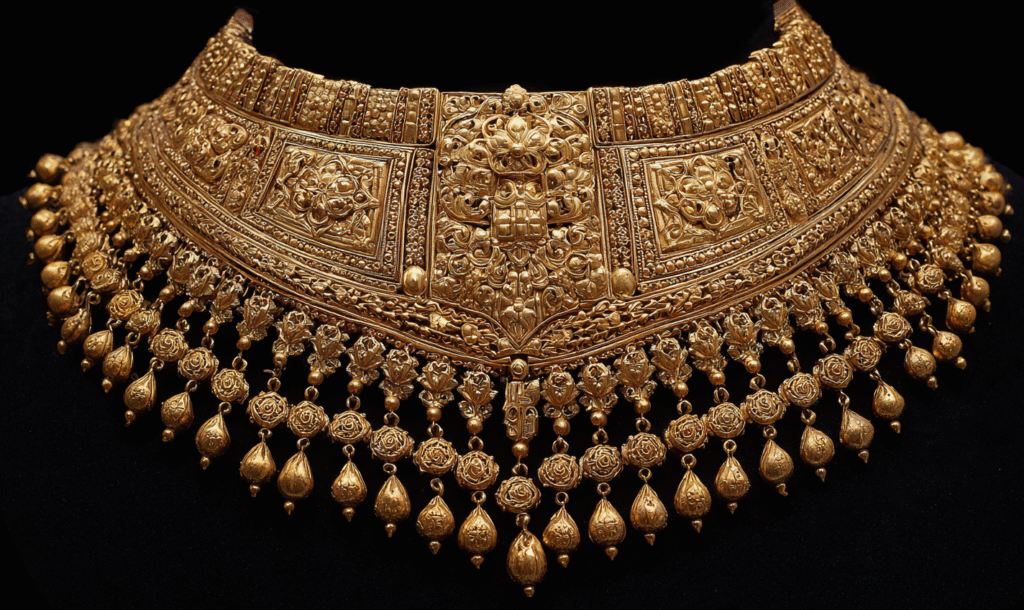
Gift-giving traditions vary significantly across cultures, with specific expectations regarding appropriate presents, timing of giving, and ceremonial presentation methods. Understanding these traditions ensures proper guidance for guests while honouring cultural expectations.
Traditional Gift Categories and Cultural Significance
Different cultures maintain distinct gift-giving traditions for wedding celebrations. South Asian traditions often emphasise practical household items, jewellery, or monetary gifts presented in specific formats. Gold items hold particular significance, with many families presenting precious metal gifts that carry auspicious meaning.
Nigerian gift traditions vary across ethnic groups but commonly include household items, clothing, or monetary contributions that support the couple’s new household establishment. The presentation of gifts often follows specific protocols, with family representatives making formal presentations during designated ceremony portions.
Understanding these traditional expectations helps couples provide appropriate guidance to guests while ensuring cultural protocols are properly observed. Many couples choose to blend traditional gift expectations with contemporary registry approaches, creating comprehensive giving options.
Wedding Favours with Cultural Significance
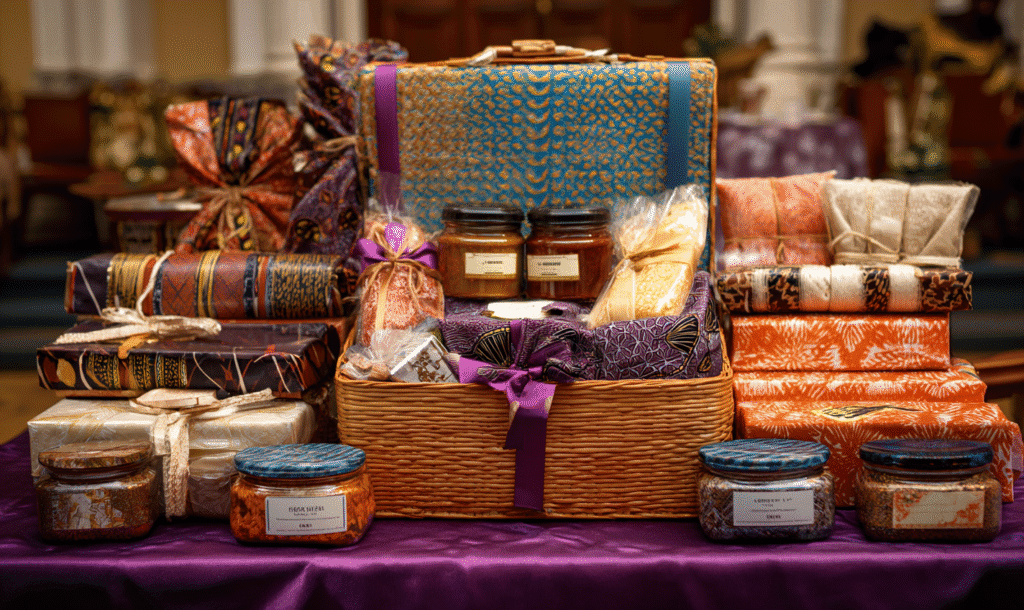
Wedding favours provide opportunities to share cultural heritage with guests while creating meaningful mementoes of the celebration. Thoughtful favour selection can introduce cultural elements to guests while expressing gratitude for their participation.
Traditional Favour Concepts Across Cultures
Different cultures approach wedding favour traditions with varying emphasis and specific item categories. South Asian celebrations often feature mithai (traditional sweets) or small religious items such as miniature idols or prayer beads that carry spiritual significance.
Nigerian favour traditions might include traditional crafts, spices, or small items that represent cultural heritage, while providing practical value. The presentation of favours often follows specific protocols, with particular attention to packaging that reflects cultural aesthetic preferences.
Many couples choose items that tell cultural stories or represent specific traditions, using these small gifts as opportunities to educate guests about heritage elements while providing lasting celebration mementoes.
Wedding Flowers and Cultural Symbolism
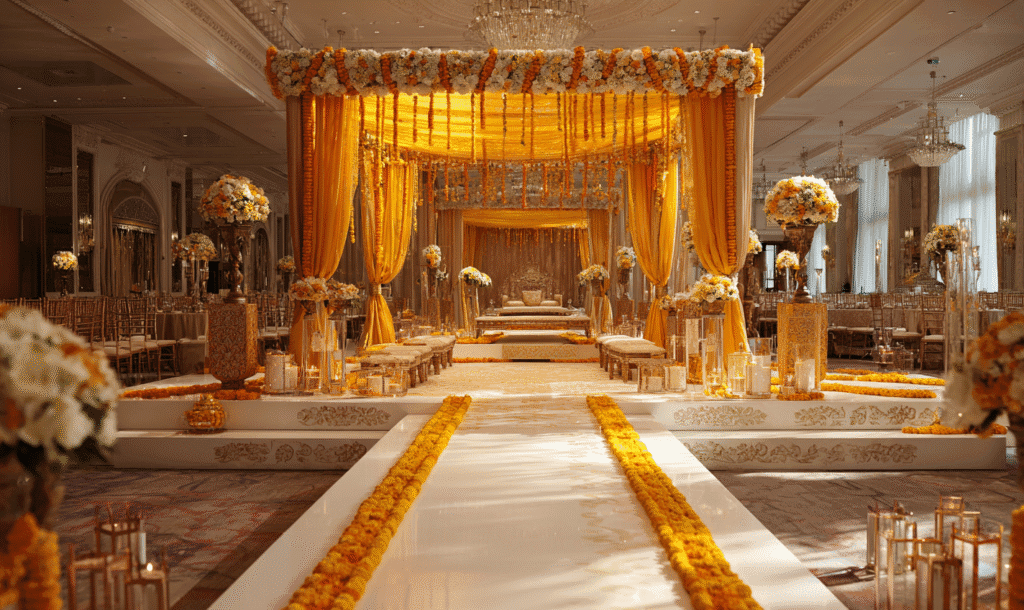
Floral selections for multicultural weddings extend beyond aesthetic preferences to encompass cultural symbolism and ceremonial requirements. Understanding these elements ensures appropriate incorporation while creating beautiful celebration environments.
Culturally Significant Blooms and Their Meanings
Different cultures associate specific flowers with marriage celebrations, each carrying particular symbolic significance. South Asian traditions emphasise marigolds for auspiciousness, jasmine for divine hope, and roses for passionate love. These flowers often appear in ceremonial garlands, mandap decorations, and bridal adornments.
Nigerian floral traditions incorporate blooms with healing and protective symbolism, alongside flowers that represent sweetness and prosperity in married life. The selection and arrangement of these flowers often follow specific cultural protocols that acknowledge ancestral traditions.
Working with florists who understand cultural flower symbolism ensures meaningful incorporation alongside aesthetic beauty. Many specialist florists serving diaspora communities have developed expertise in sourcing traditional blooms while creating contemporary arrangements.
Wedding Vows Across Cultural Traditions
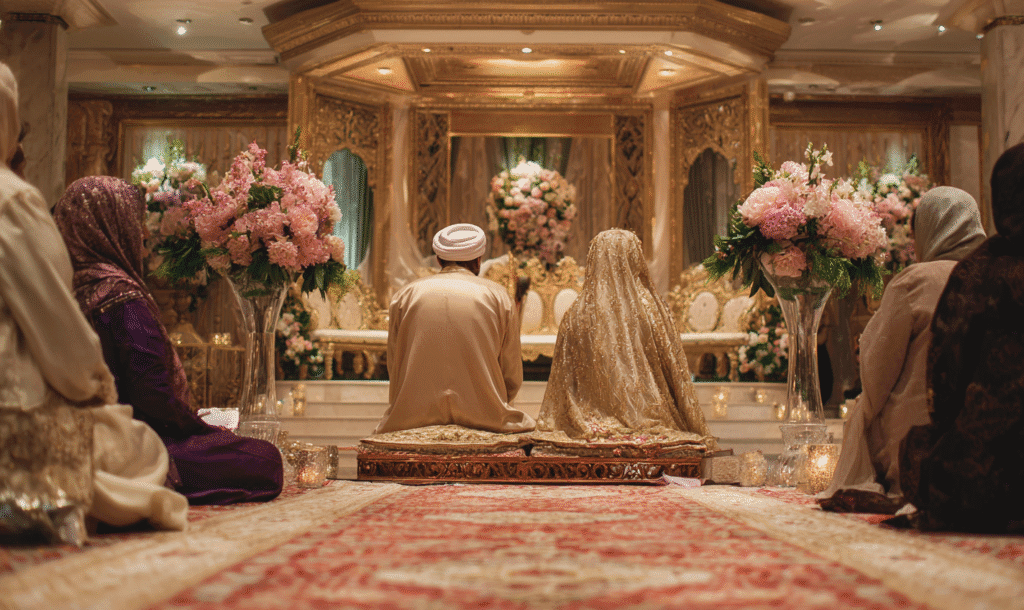
Wedding vows represent deeply personal expressions of commitment that often incorporate cultural traditions alongside individual promises. Understanding traditional vow formats across cultures provides a foundation for creating meaningful personal expressions.
Traditional Vow Formats and Cultural Elements
Different religious and cultural traditions maintain specific vow formats that carry spiritual and cultural significance. Hindu wedding vows often incorporate Sanskrit expressions alongside seven specific promises made during the ceremony. Muslim nikah ceremonies feature specific commitment expressions that reference religious obligations alongside personal promises.
Nigerian wedding traditions include various vow formats that may incorporate ancestral acknowledgement, family blessing requests, and specific promises that reflect cultural values. These traditional elements often form the foundation for contemporary vow creation while maintaining cultural authenticity.
Understanding these traditional formats allows couples to incorporate meaningful cultural elements while expressing personal commitment in ways that feel authentic to their relationship and heritage.
Wedding Cakes and Cultural Dessert Traditions
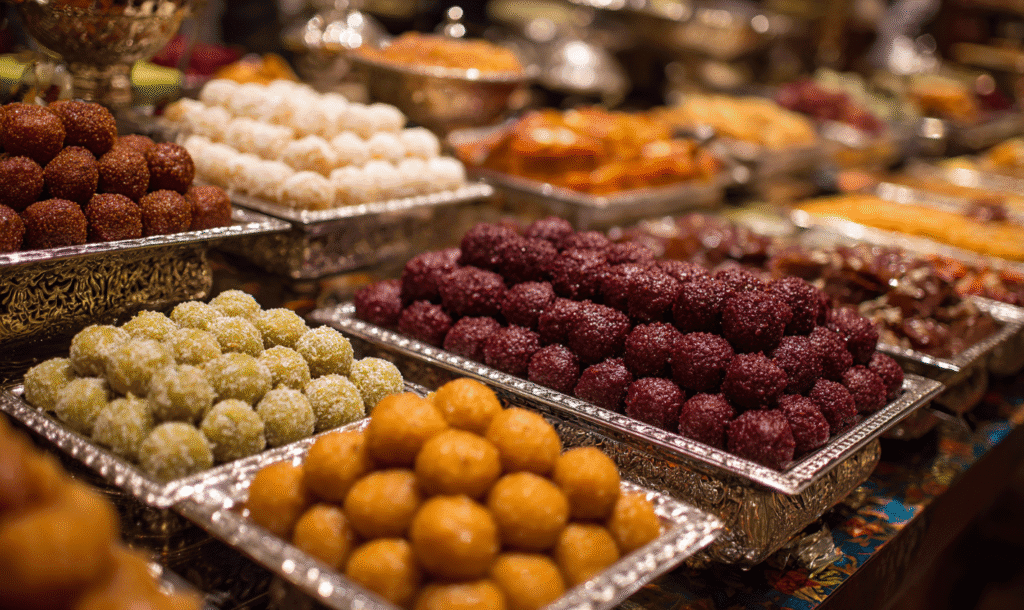
Wedding cake selection for multicultural celebrations often involves balancing traditional dessert expectations with contemporary celebration requirements. Understanding cultural dessert traditions ensures appropriate incorporation alongside modern cake designs.
Traditional Desserts and Cultural Significance
Many cultures maintain specific dessert traditions associated with marriage celebrations. South Asian weddings typically include mithai (traditional sweets) such as ladoo, barfi, or jalebi, often distributed as blessings. These sweets carry specific cultural meanings, with certain varieties symbolising sweetness in married life or prosperity for the couple.
Nigerian celebration desserts might include traditional options such as chin chin or puff puff alongside regional specialities that reflect specific ethnic traditions. These traditional elements often carry cultural significance beyond simple dessert provision.
Many couples choose to serve traditional desserts alongside contemporary wedding cakes, honouring cultural expectations while providing familiar options for guests from diverse backgrounds.
Wedding Songs and Musical Traditions
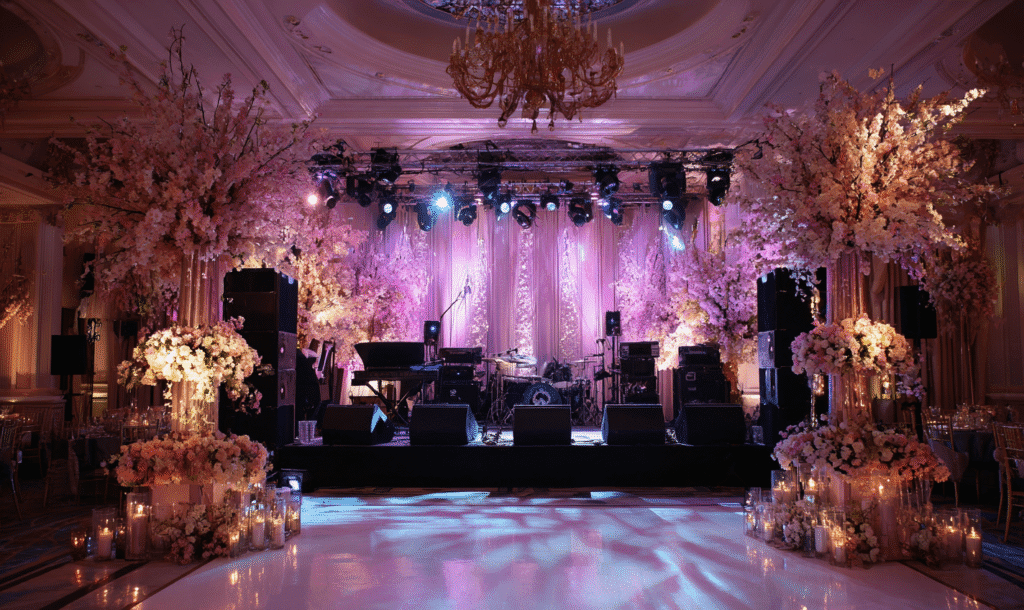
Musical selections for multicultural weddings provide opportunities to showcase cultural heritage while creating inclusive celebration atmospheres. Understanding traditional music elements alongside contemporary preferences ensures appropriate celebration soundtracks.
Cultural Music Traditions and Ceremonial Requirements
Different cultures maintain specific musical traditions for wedding ceremonies and celebrations. South Asian weddings often incorporate classical music for religious ceremonies alongside contemporary Bollywood selections for celebration portions. Nigerian celebrations frequently blend traditional ethnic music with Afrobeats and contemporary international selections.
The selection of ceremony music requires an understanding of cultural protocols and religious requirements. Certain musical elements may be essential for specific rituals, while others serve primarily atmospheric purposes. Working with musicians familiar with cultural traditions ensures appropriate incorporation while maintaining ceremonial authenticity.
Many couples choose to create musical journeys throughout their celebrations, with ceremony music featuring traditional elements while reception music blends cultural classics with contemporary selections that appeal to diverse guest backgrounds.
Wedding Planning for Multicultural Celebrations
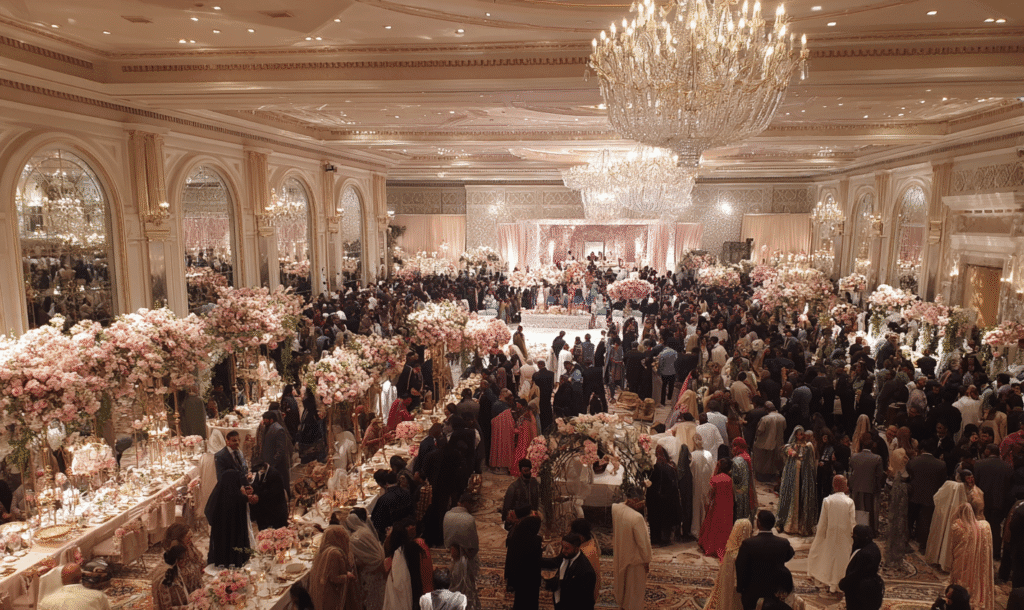
Wedding planning for multicultural celebrations requires extended timelines and specialised coordination to accommodate cultural requirements alongside contemporary celebration elements. Understanding these additional considerations ensures successful celebration execution.
Extended Planning Timelines and Cultural Considerations
Cultural wedding planning typically requires longer lead times than conventional British celebrations due to multiple event coordination, larger guest lists, and specialised supplier requirements. Beginning planning 12-18 months in advance allows adequate time for venue booking, cultural supplier coordination, and traditional attire sourcing. Many couples find that cultural celebrations require even longer preparation periods, particularly when incorporating multiple traditions or planning destination elements.
Early planning phases should include determining cultural requirements, establishing family contribution expectations, and identifying specialist suppliers who understand traditional needs. Many cultural elements require custom creation or international sourcing, necessitating extended lead times. For example, traditional wedding attire may need to be ordered from specialist designers, ceremonial items might require sourcing from cultural suppliers, and specialist caterers often book well in advance.
Creating comprehensive planning checklists that incorporate cultural requirements alongside standard wedding elements ensures thorough preparation while maintaining organisation throughout the extended planning process. These checklists should include culture-specific timelines, such as when to book henna artists for South Asian celebrations or when to arrange traditional music groups for Nigerian ceremonies.
Budget considerations for cultural weddings often differ significantly from conventional British celebrations. Multiple events over several days may require separate venues, catering, and attire for each occasion. Traditional elements such as elaborate mandap construction, specialist cultural entertainment, or authentic cuisine preparation can represent substantial budget items that require early planning and allocation.
Wedding Hall Selection for Large Cultural Celebrations
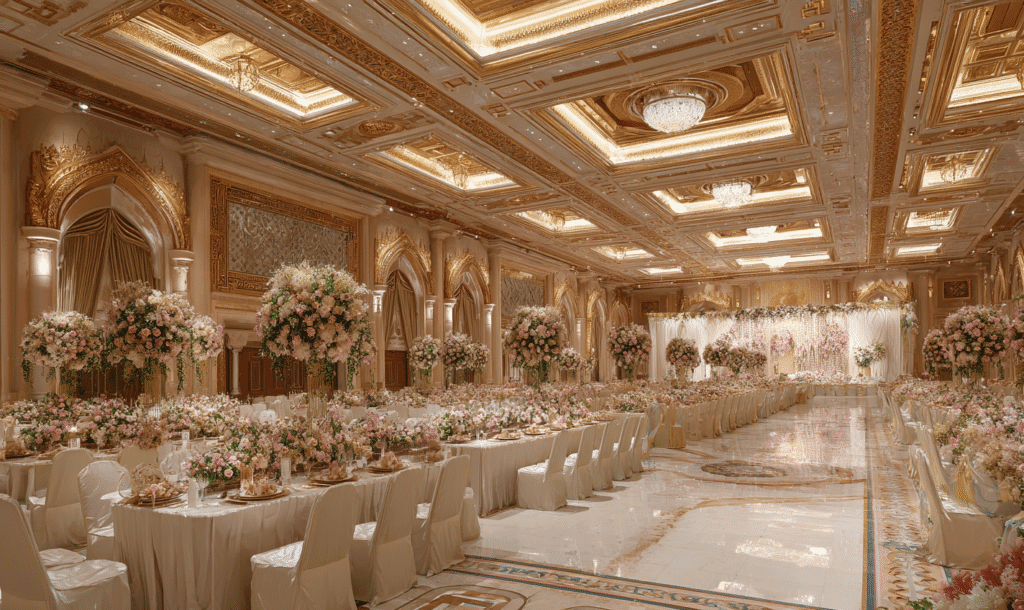
Wedding hall selection for cultural celebrations involves specific considerations regarding capacity, cultural accommodation, and ceremonial flexibility. Understanding these requirements ensures appropriate venue selection for large-scale celebrations.
Capacity and Layout Considerations for Cultural Events
Cultural celebrations often require significantly larger venues than typical British weddings, with guest lists frequently reaching 300-500 attendees or more. Venue evaluation must consider not only maximum capacity but comfortable accommodation of these numbers alongside specific cultural requirements.
Consider whether venues can accommodate ceremonial elements such as mandap installations, stage setups for cultural presentations, or separate areas for gender-specific celebration portions. Many cultural celebrations require flexible space utilisation throughout extended event periods.
Muslim Wedding Traditions and Requirements
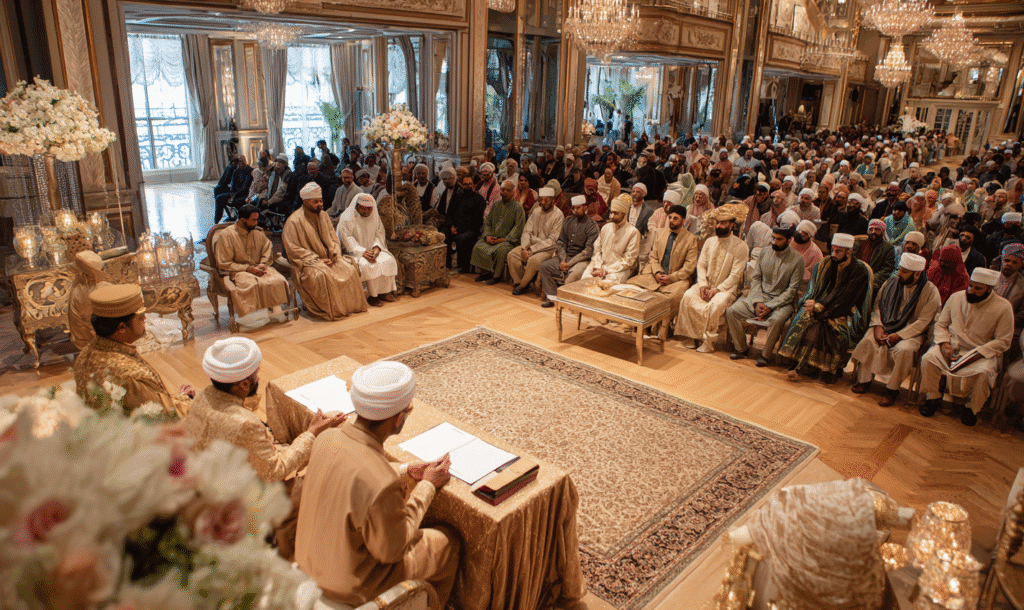
Muslim wedding celebrations incorporate specific religious requirements alongside cultural traditions that vary across different ethnic backgrounds. Understanding these elements ensures appropriate ceremony planning and venue selection.
Religious Requirements and Ceremonial Elements
Muslim wedding ceremonies centre around the nikah, which involves specific religious elements including Quranic recitations, witness requirements, and formal contract signing. Venues must accommodate these religious requirements while providing an appropriate atmosphere for sacred ceremony elements.
Many Muslim celebrations require separate accommodation for men and women during specific ceremony portions, necessitating venues with flexible space arrangements. Prayer time, accommodation and appropriate facilities for religious observance become additional venue considerations.
Hindu Wedding Ceremonies and Cultural Elements
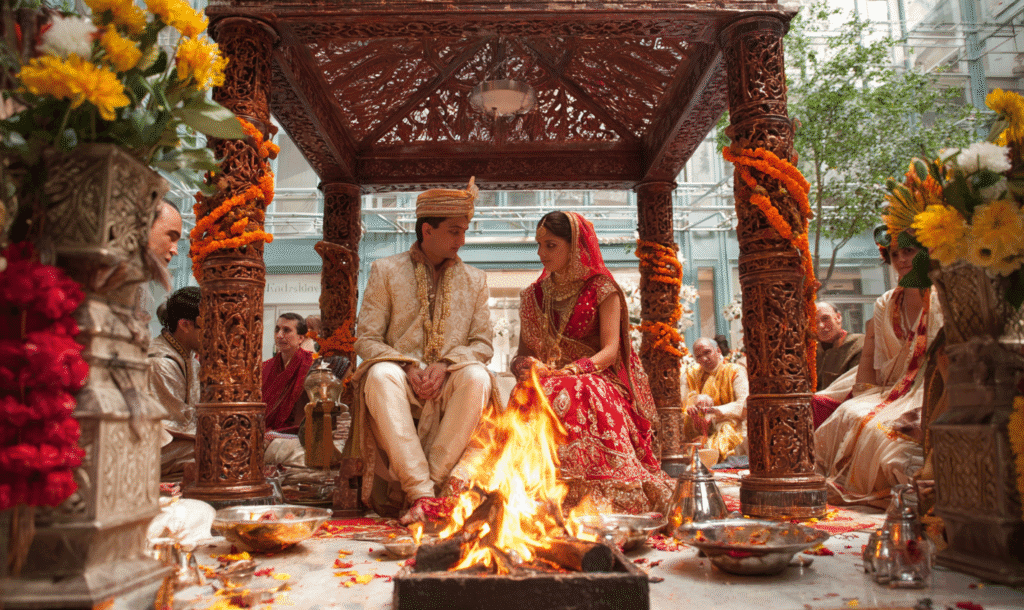
Hindu wedding celebrations involve elaborate multi-day celebrations with specific ceremonial requirements that must be accommodated by venues and suppliers. Understanding these traditions ensures appropriate celebration planning.
Ceremonial Requirements and Sacred Elements
Hindu weddings centre around sacred fire ceremonies that require proper ventilation, safety measures, and appropriate space for mandap installation. These ceremonial elements carry deep spiritual significance and must be accommodated with proper respect and understanding.
Pre-wedding celebrations such as mehndi ceremonies, sangeet celebrations, and other traditional events require flexible venue arrangements that can accommodate different group sizes and activity types throughout the celebration period.
Jewish Wedding Traditions and Contemporary Celebrations
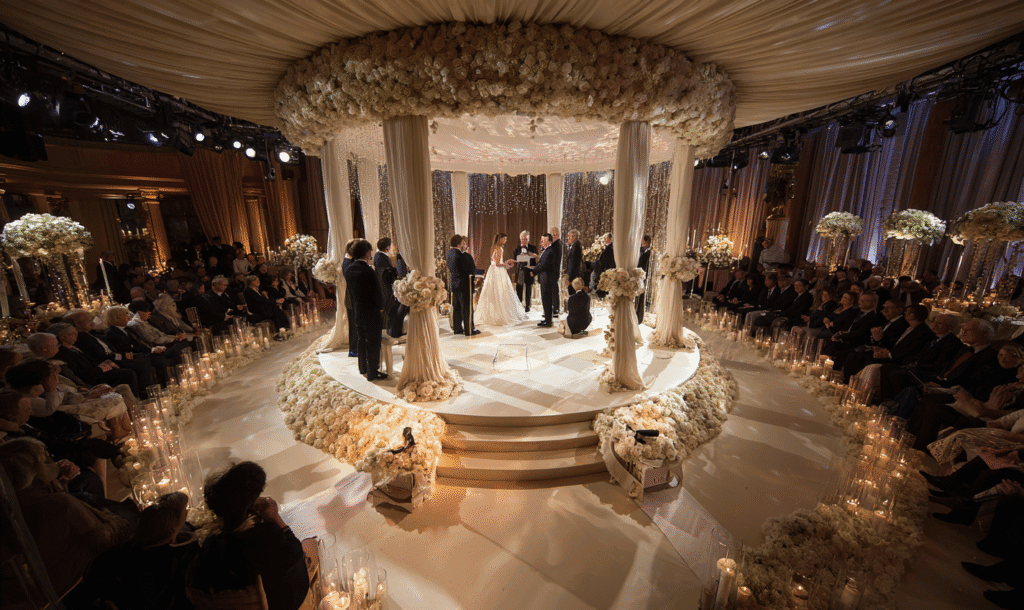
Jewish wedding celebrations blend ancient religious traditions with contemporary celebration elements, requiring venues and suppliers who understand both traditional requirements and modern interpretation approaches.
Religious Elements and Ceremonial Requirements
Jewish weddings centre around the chuppah ceremony, which requires appropriate space for canopy installation and accommodation of traditional elements, including glass breaking, ring exchanges, and specific blessings that carry deep religious significance.
Many Jewish celebrations incorporate traditional elements such as the ketubah signing, special meal requirements, and specific music traditions that require understanding from venues and suppliers to ensure appropriate accommodation.
Nigerian Wedding Celebrations and Cultural Traditions
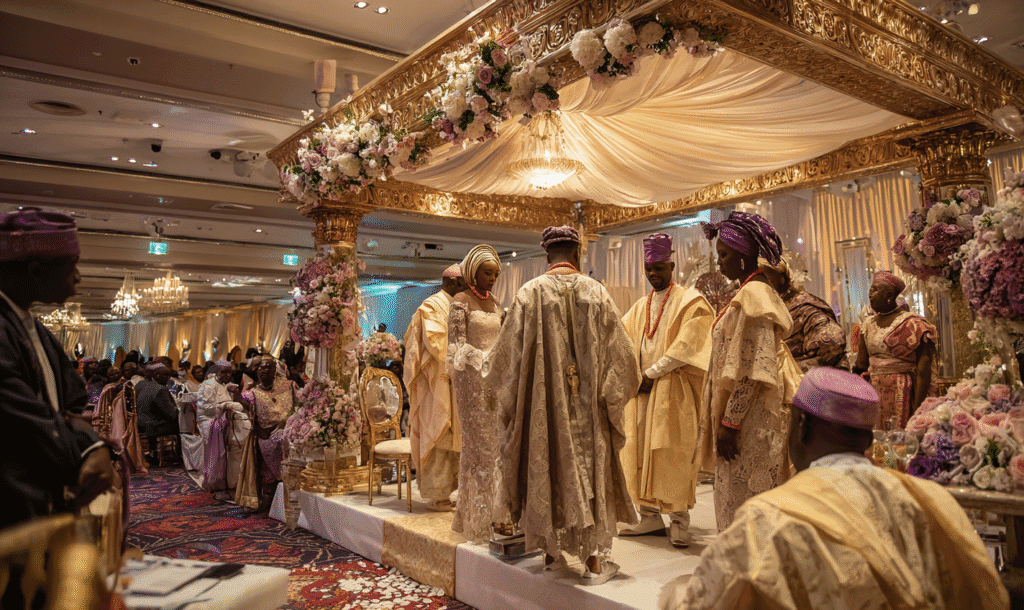
Nigerian wedding celebrations showcase vibrant cultural traditions that vary across the country’s diverse ethnic groups, while sharing common elements of joyful celebration and family unity.
Traditional Elements Across Nigerian Ethnic Groups
Nigerian weddings incorporate traditions from various ethnic backgrounds, including Yoruba, Igbo, Hausa, and other regional cultures, each maintaining distinct ceremonial elements alongside shared celebration values.
Yoruba traditional ceremonies often involve elaborate engagement presentations, specific attire requirements, and traditional blessing formats that require understanding from venues and suppliers. These traditional elements often require flexible venue arrangements that can accommodate ceremonial presentations and interactive celebration elements.
Indian Wedding Celebrations Across Cultural Traditions
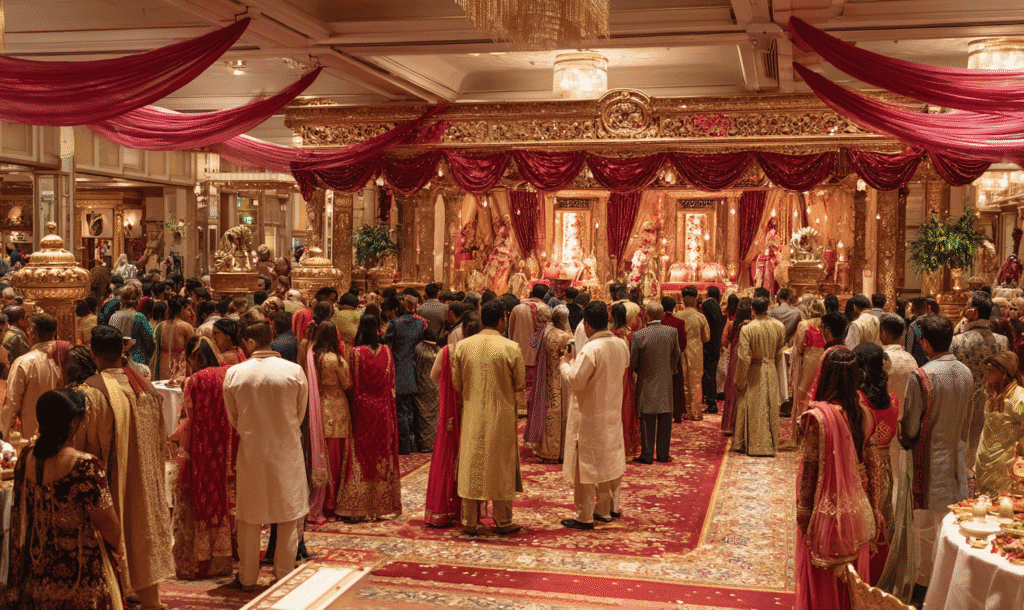
Indian wedding celebrations encompass diverse regional and religious traditions united by shared cultural values of family celebration, traditional honour, and elaborate festivity that spans multiple days and events.
Regional Diversity in Indian Wedding Traditions
Indian weddings vary significantly across different regional backgrounds, with Punjabi, Gujarati, Bengali, Tamil, and other regional traditions maintaining distinct ceremonial elements, traditional attire requirements, and specific celebration customs.
These regional variations might involve different ceremony sequences, specific traditional music and dance requirements, or particular menu preferences that require specialised understanding from venues and suppliers familiar with diverse Indian cultural traditions.
Conclusion
Planning a multicultural wedding in the UK requires thoughtful consideration of cultural traditions alongside contemporary celebration expectations. Success lies in understanding which traditional elements carry the deepest significance for your families, while identifying opportunities to express individual style and personal preferences.
The most memorable celebrations thoughtfully blend ancestral customs with modern touches, creating unique expressions of cultural identity that honour heritage while reflecting the couple’s contemporary life in Britain. This balance requires working with suppliers who understand cultural requirements while bringing modern expertise and creative sensibilities to the celebration planning process.
Whether planning an intimate gathering or a grand celebration for hundreds of guests, the key lies in clear communication about cultural requirements, adequate planning to accommodate traditional elements, and selection of venues and suppliers who approach cultural celebrations with understanding, respect, and professional expertise.
Ready to Begin Planning?
Creating a wedding that beautifully blends cultural traditions with contemporary elegance requires expertise, understanding, and meticulous attention to detail. At Cavendish Banqueting, we specialise in hosting celebrations that honour heritage while exceeding modern expectations for style, service, and sophistication.
Our experienced team understands the nuances of multicultural celebrations and works closely with couples to ensure every traditional element is appropriately accommodated while creating stunning contemporary celebration environments. Contact us today to discuss your celebration requirements and discover how our expertise in cultural weddings can help create the perfect beginning to your married life together.
Frequently Asked Questions
When to book your wedding venue?
Wedding venues in London, particularly those accommodating Asian wedding celebrations, often require booking 12-18 months in advance due to high demand and limited capacity for large cultural celebrations. Asian wedding venues in London establishments that can host 300-500 guests are especially sought after, making early booking essential for securing your preferred date and location.
Indian wedding venues and other cultural celebration spaces fill quickly during peak wedding seasons (April-June and September-November). Working with experienced venues that understand cultural requirements and maintain strong relationships with specialist suppliers ensures successful celebrations even with limited availability, making professional guidance essential for securing appropriate spaces.
How much do wedding dresses cost?
Wedding dress UK prices vary significantly depending on style, designer, and cultural requirements. Traditional South Asian bridal lehengas range from £800 to £5,000, while fusion wedding dresses incorporating cultural elements typically cost £1,200 to £3,500. Plus-size wedding dresses and long-sleeved wedding dresses for modest requirements may command premium pricing due to custom fitting needs.
Designer South Asian bridal wear from established British designers can exceed £8,000, particularly for heavily embellished pieces featuring intricate handwork and precious metal detailing. Many couples budget 15-20% of their total wedding costs for bridal attire, including accessories, alterations, and multiple outfit changes required for multi-day cultural celebrations.
How to wear a wedding and engagement ring?
Wedding rings for women and men’s wedding rings are traditionally worn on the fourth finger of the left hand in British custom, though cultural traditions may vary. In Hindu ceremonies, wedding rings for men and women might be worn alongside traditional gold bangles, while Muslim couples may choose white gold wedding rings or other metals based on religious preferences and family traditions.
Cultural considerations influence ring-wearing customs significantly across different traditions. Some South Asian families prefer stacking wedding and engagement rings, while others maintain separate wearing patterns. Consult with family elders and cultural advisors to understand specific traditions relevant to your background, ensuring appropriate respect for ancestral customs while accommodating personal preferences.
What should I write in a wedding card?
Wedding wishes for multicultural celebrations should reflect cultural sensitivity while expressing genuine congratulations. Traditional South Asian wedding anniversary wishes often incorporate blessings for prosperity, fertility, and spiritual harmony, while Muslim celebrations favour Arabic expressions invoking divine protection. Nigerian wedding cards frequently include ancestral blessings and community prosperity wishes reflecting cultural values.
Contemporary wedding anniversary wishes for couples can blend traditional formats with modern expressions accessible to diverse wedding guests. Consider including brief translations of cultural blessings alongside English messages, creating meaningful connections between heritage wisdom and present-day celebrations, while ensuring all recipients understand the significance and heartfelt nature of your sentiments.
How much money should I give as a wedding gift?
Wedding anniversary gifts in South Asian and Nigerian cultures traditionally emphasise monetary contributions presented in auspicious amounts, often ending in 1 or 51 (£101, £151, £501) for prosperity symbolism. The relationship to the couple, your financial circumstances, and regional expectations influence appropriate amounts, typically ranging from £51 for distant relatives to £501+ for immediate family members.
Cultural protocols vary significantly across different communities and regions. Indian wedding gift amounts may differ from Pakistani or Bangladeshi expectations, while Nigerian traditions vary across ethnic groups. Consider consulting with family members familiar with specific cultural expectations, while ensuring your contribution reflects genuine affection rather than social obligation pressures that may cause financial strain.
What is the flower for a 40th wedding anniversary?
Wedding anniversary traditions vary across cultures, with the 40th wedding anniversary typically associated with ruby themes in Western traditions, though specific wedding flowers for this milestone aren’t universally established. South Asian traditions may emphasise marigolds and jasmine for significant anniversaries, representing continued auspiciousness and divine blessings in married life, while incorporating roses for enduring passionate love.
Contemporary couples often blend traditional flower symbolism with personal preferences for anniversary celebrations. Wedding bouquet flowers from the original ceremony, such as roses, jasmine, or marigolds, can be recreated for milestone celebrations, creating meaningful connections between past and present. Consider consulting cultural advisors about appropriate flowers that honour your specific heritage while celebrating this significant marital milestone.
What is the role of the wedding planner in a Muslim wedding?
Muslim wedding planners coordinate religious requirements alongside celebration logistics, ensuring nikah ceremonies comply with Islamic traditions while accommodating family preferences and cultural variations. They manage timing around prayer schedules, arrange appropriate gender-separated spaces when required, coordinate with Islamic officiants, and ensure halal catering throughout all celebration components.
Specialist Muslim wedding coordination includes understanding cultural variations across Pakistani, Bangladeshi, Arab, and other Islamic traditions that influence ceremony structure, attire requirements, and celebration customs. Professional planners maintain relationships with halal caterers, Islamic musicians, and cultural decorators while navigating family expectations and religious obligations. Their expertise proves invaluable in creating celebrations that honour faith requirements while providing contemporary elegance and seamless logistics coordination.
What are the main costs to consider for an Indian wedding?
Indian wedding costs typically exceed traditional British celebrations due to multiple events, larger guest counts, and cultural requirements. Major expense categories include venue hire (often £8,000 to £25,000 for large banquet hall facilities), catering for 300-500 guests (£15,000-£40,000), traditional attire (£2,000-£8,000), and cultural entertainment including specialist musicians and decorators (£5,000-£15,000).
Additional considerations include mandap construction, henna artists, traditional sweet distributions, and often multiple venue bookings for different celebration components. Many families budget £40,000-£100,000+ for comprehensive Indian wedding celebrations, though costs vary significantly based on guest count, venue selection, and specific cultural requirements. Early budget planning helps prioritise essential cultural elements while managing overall expenses effectively.
How can you plan an inexpensive wedding in a wedding venue in London?
Budget-conscious couples can reduce wedding venue London costs by considering off-peak dates (November-March), weekday celebrations, or afternoon ceremonies with early evening conclusions. Many banqueting halls offer reduced pricing for Sunday celebrations or provide comprehensive packages that include catering, decoration, and entertainment at competitive rates compared to itemised bookings.
Alternative approaches include exploring different package options, negotiating comprehensive deals that bundle services, or working with venues that offer flexible payment terms. Consider venues offering dry hire options that allow external catering and suppliers, potentially reducing overall costs. Some cultural community centres provide affordable venue hire for religious ceremonies, allowing budget allocation towards reception venues and celebration elements.
How early should you start planning your wedding?
Wedding planning for cultural celebrations requires extended timelines, typically beginning 12-18 months before your desired date to accommodate venue booking, supplier coordination, and traditional element sourcing. Asian wedding planning often involves multiple events over several days, requiring comprehensive coordination that extends beyond typical British wedding timelines and considerations.
Indian wedding planning and other cultural celebrations necessitate early booking due to specialist supplier availability and custom creation requirements. Traditional attire, cultural caterers, and ceremonial decorators often require significant lead times. Creating detailed wedding planning checklist items that incorporate cultural requirements alongside standard elements ensures thorough preparation while maintaining organisation throughout the extended planning process.
